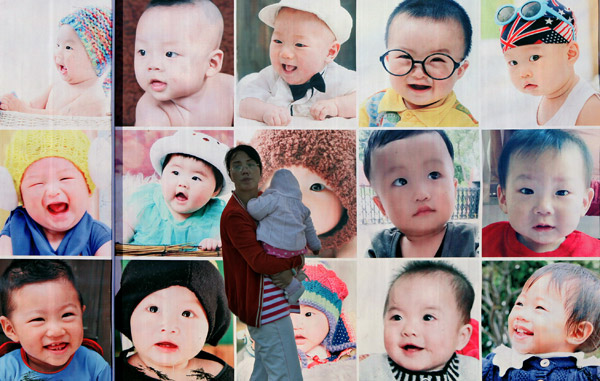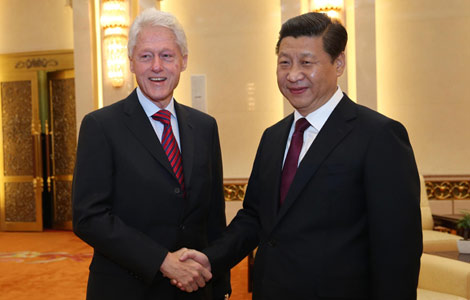Nation braces for more babies
Updated: 2013-11-19 00:56
By XU WEI in Beijing and WANG HONGYI in Shanghai (China Daily)
|
||||||||
Couples must wait for new local policies
|
 |
|
A mother holds her child in front of a wall with photos of babies in Taizhou, Zhejiang province, on Sunday. Couples will be allowed to have two children if one of the parents is an only-child. Pan Kanjun / For China Daily |
Family planning and health authorities at local levels said they will brace for the loosening of the one-child policy and be ready to respond to a potential rise in birthrate.
Couples with one spouse who is an only child will be permitted to have two children under a decision announced on Friday by the Third Plenary Session of the 18th Communist Party of China Central Committee.
The Beijing Commission of Health and Family Planning has researched the possible effect of the policy change on the city's population and is prepared, said Li Lehua, a publicity official with the commission.
However, under population and family planning law, the decision to change the policy in a provincial region must be made by the Standing Committee of the People's Congress in that region, which means couples interested in having a second child need to wait until lawmakers authorize the change.
The conference of the standing committee at a provincial level is held every two months.
The Beijing Health Bureau told the Beijing Morning Post that many maternal- and child-care service centers in the city are developing plans to expand the number of hospital beds and improve service to cope with the potential increase in new births.
The Guangdong provincial commission of health and family planning said it will work out measures to enable its eligible residents to take advantage of the policy as soon as possible.
The Shanghai Health and Family Planning Commission announced on Monday that it will research and devise a plan and supporting policies for implementing the new policy.
It posted on its micro blog that the revised policy is expected to alleviate 19 consecutive years of negative growth in Shanghai's population and provide a solution to the growing aging community and lack of children in families.
The authority also said it will ensure that supporting services and facilities will be in place.
However, there is much work that should be done before putting the new policy into practice, said Zhang Meixing, an official from the Shanghai commission.
"Next, we need to refine our figures and work out a plan for the transition from the old policy to the new one and solve the question of how to distribute public resources," Zhang was quoted as saying by Youth Daily.
Wang Jieying, a spokesman for the Health and Family Planning Commission in Henan province, told Xinhua News Agency that the relaxed policy would lead to a minor surge in the province's birthrate.
"But the overall birth volume would be under control, and the policy is applicable," he said.
Henan is China's most populous province, with a population of 105 million people.
The new policy would result in 50,000 to 80,000 more babies born each year, Wang said.
Wang Pei'an, vice-minister of the National Health and Family Planning Commission, said in an online news release that the authority will not set a timetable for implementing the new policy in different provinces.
Some experts have said that the policy would first be implemented in eastern provinces, which face more urgent problems of population aging and decreasing labor forces.
"The provinces and municipalities in the east would be the first to implement the new policy because there is a higher urbanization rate, and the family planning policy was better implemented in the past 30 years," said Li Jianmin, a professor with the population and development research institute at Nankai University.
Lu Jiehua, a professor of demographic study at Peking University, agreed, adding that local authorities are also unlikely to set an age limit for couples to give birth to their second child as they are having their first child at a much older age than previously.
Lu said that the policy would not lead to a substantial population surge.
"Most of the couples who are eagerly awaiting the policy are those who were born in the 1970s and fear they'll be too old to have more children. For couples born in the 1980s, they still have enough time to make a decision," he said.
Wang Qingyun in Beijing and Li Wenfang in Guangzhou contributed to this story.
- At least 29 killed in train collision in Egypt
- Kerry to visit Israel to discuss Iran deal
- 100 killed in tribal clashes in Sudan
- Commonwealth urges for inclusive growth
- Hot air balloons take off at Int'l Balloon Festival
- 5 foreigners, including 3 Chinese, missing in furnace blast in E. India: official
 NASA launches robotic explorer to Mars
NASA launches robotic explorer to Mars
 Survivors of Midwest tornado sift through wreckage
Survivors of Midwest tornado sift through wreckage
 Chinese manufacturers feel their way in African market
Chinese manufacturers feel their way in African market
 Change in energy mix encouraging
Change in energy mix encouraging
 Floral farewell to Garden Expo
Floral farewell to Garden Expo
 Nation braces for more babies
Nation braces for more babies
 Xi Jinping meets former US president Clinton
Xi Jinping meets former US president Clinton
 5 dead as tornadoes ravage US Midwest
5 dead as tornadoes ravage US Midwest
Most Viewed
Editor's Picks

|

|

|

|

|

|
Today's Top News
Officials take to global stage as China's influence grows
Alipay streamlines travel
NASA launches robotic explorer to Mars
China increases US debt holdings
China in midst of refinery boom
China eyes green plan for 2030
Survivors of US tornado sift through wreckage
Xi thanks Clinton for furthering ties
US Weekly

|

|






